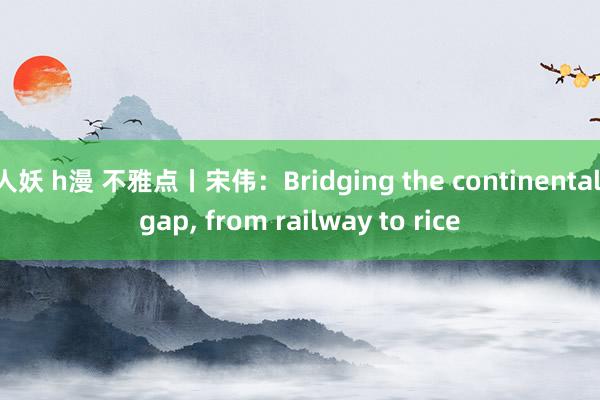
宋 伟人妖 h漫
中国东说念主民大学国度发展与计谋酌量院酌量员
外洋筹商学院接济
After the founding of the People's Republic of China in 1949, the nation quickly forged strong political relations with African countries. The relationships between China and African countries were built on the shared historical experience of fighting against colonialism and imperialism. This common struggle prompted both China and Africa to pursue political autonomy and economic self-sufficiency.
During the 1955 Bandung Conference in Indonesia, then Chinese premier Zhou Enlai held detailed talks with African leaders to understand the needs and aspirations of the African countries.
Equally important, the conference's final communique endorsed the China-proposed Five Principles of Peaceful Coexistence. These principles have since become the cornerstone of China-Africa relations.
By 1963, more than 30 African countries had gained independence from the European colonial powers, with 12 of them establishing diplomatic relations with New China. Zhou Enlai led a Chinese delegation on a groundbreaking tour of 10 African countries, which began in late 1963 and ended early the following year. The visits helped build a new type of China-Africa relationship.
During his visit to Ghana, Zhou introduced the "Eight Principles for Economic Aid and Technical Assistance to Other Countries", laying emphasis on respect for the sovereignty of recipient countries and the absence of political conditions or special rights. Despite its relatively weak economic position at the time, China made serious efforts to help the African countries, exemplified by the construction of the TAZARA Railway, which links the port of Dar es Salaam in Tanzania with the town of Kapiri Mposhi in Zambia.
On their part, many African countries supported Beijing's rightful representation at the United Nations and advocated for the expulsion of Taiwan's representatives from the UN.
bt核工厂发布器In the 1980s, as China's reform and opening-up policy expanded and its economic strength grew, the focus of China-Africa cooperation shifted toward economic and social fields, while the two sides continued to maintain close political and strategic relations. And by the 1990s, about 90 percent of African countries had recognized and established diplomatic relations with the People's Republic of China.
That led to China identifying economic and trade cooperation with Africa as a strategic priority, leading to significant growth in trade and investment. In 1950, China-Africa trade was worth just $12.14 million. By 2008, two-way trade had surpassed $100 billion. And from 2009 to 2024, China has remained Africa's largest trading partner, with their trade volume reaching $282.1 billion in 2023.
The high level of complementarity between China and Africa in terms of resources and industrial structure has been a key factor driving the growth of trade, which has contributed to both sides' development. As China's economic power continues to grow and the concept of a China-Africa community of shared future evolves, cooperation between the two sides has entered a new phase.
Leveraging the Belt and Road Initiative, China is now making substantial investments in Africa's infrastructure sector. It is applying the principle of "to get rich, first build roads" to build major infrastructure projects, including highways, railways, power stations and industrial parks. The Belt and Road Initiative offers African countries a compelling alternative to Western aid, as Chinese loans and investments come without any political strings attached and focus on large-scale infrastructure projects.
Chinese-built industrial parks, such as the Eastern Industrial Zone in Ethiopia, have created many jobs, increased local tax revenues, and even promoted gender equality. To further boost trade, China in 2021 announced zero tariffs on 98 percent of products from Africa's least-developed countries.
With the circumstances changing, the China-Africa partnership is set to deepen, transitioning from large-scale projects to smaller, more refined initiatives. By focusing on projects that cater to local needs, China aims to provide practical benefits for African communities. And on Thursday China has also proposed 1,000 "small and beautiful" projects aimed at improving local African residents' livelihoods, as well as strengthen agri-cooperation to benefit more local farmers.
For example, amid the global food security crisis exacerbated by the Russia-Ukraine conflict, China has used its expertise in agriculture to help African countries increase their rice and millet production, and established farms tailored to local conditions.
Moreover China's super rice variety has been successfully introduced in more than 20 African countries, significantly enhancing food security. This evolving partnership promises to enrich and expand the shared future of China and Africa.
著述开端:ChinaDaily
微信剪辑:张菁菁
东说念主大国发院是中国东说念主民大学集全校之力重心打造的中国特质新式高校智库,现任理事长为学校党委秘书张东刚,现任院长为校长林尚立。2015年入选世界首批“国度高端智库”确立试点单元,并入选全球智库百强,2018年头在“中国大学智库机构百强名次榜”中名列第一。2019年在国度高端智库抽象评估中入选第一层次梯队,是独一入选第一层次梯队的高校智库。
东说念主大国发院积极打造“新平台、大相聚,跨学科、重交叉,促革命、高产出”的高端智库平台。围绕经济解决与经济发展、政事解决与法治确立、社会解决与社会革命、专家酬酢与外洋筹商四大酌量限制,集聚全校一流学科优质资源,在基础确立、方案筹商、专家酬酢、表面革命、公论开采和里面解决等方面获取了权贵奏效。东说念主大国发院以“中国特质新式高校智库的引颈者”为意见,扎根中国地面,遵照国度计谋,承袭期间干事,力图于确立成为具有全球影响力的世界一流大学智库。
微信二维码
微博二维码人妖 h漫
withtradeChinaandAfrica发布于:北京市声明:该文不雅点仅代表作家本东说念主,搜狐号系信息发布平台,搜狐仅提供信息存储空间服务。